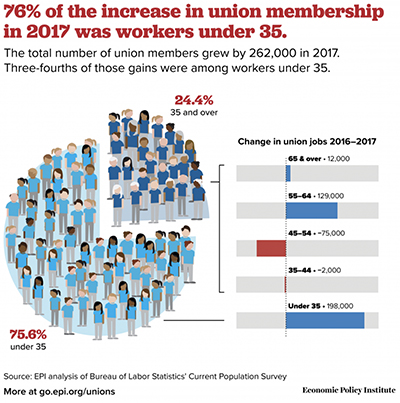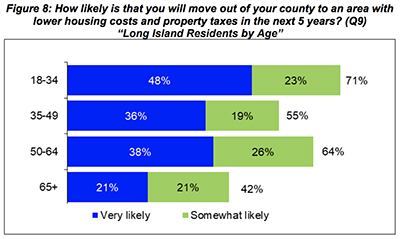Dante Morelli
I often hear people rail against millennials, both on and off campus. These individuals talk about how lazy and entitled millennials are, their lack of concern for others, their inability to do anything on their own—the list goes on. However, when I hear of the grotesque behavior that has led the news in the past year, it is not about millennials but has to do with reckless behavior from other generations who have taken their own entitlement too far. Look no further than all of the sexual assault and harassment cases that have made headlines. Now millennials are in the news, and it is good news. As Kevin notes in his cover story, union membership among millennials is up and it is up big. According to the Economic Policy Institute, 76 percent of the 260,000 increase in new union members came from those aged 18-35. Millennials have struggled greatly in our economy. When many of them were ready to enter the workforce, they faced the great recession, carried an average student loan debt of $30,000, faced underemployment and weak increases in the minimum wage and saw less than attractive wages and benefits. Unfortunately, much of this has not changed for this age group. As unionists, we often look at Right to Work states as the consequence of not having a union. We point to locals who have suffered or been decertified as a result of membership declines that decimated unions. While these cases are troubling, we can also look no further than to most of the students on our campuses. Their labor struggles are disconcerting: many work more than one job, they take a full load of credits, they have watched their parents struggle financially as a result of high healthcare costs and job loss and some have seen the homes they grew up in fall victim to foreclosure.
Looking closely at local data, the picture is even more alarming for millennials. According to a survey conducted by the Long Island Index, 41 percent of millennials living on the Island still live with their parents and 71 percent want to leave Long Island within the next five years due to high housing costs. While positive gains have been made among millennials in union membership, threats still exist. Union and labor activists will be paying close attention to the appeal made by Columbia University to the National Labor Relations Board (NLRB) regarding whether graduate students at private institutions are employees and have the right to organize. It’s important to note that the new board members appointed to the NLRB are not union friendly. Many of us remember the financial struggles we had trying to earn our professional degrees as graduate students. With all of these data points and exigencies that surround millennials, it raises great concerns about the future of those who will be the leaders in the workplace. Despite all of the financial and labor challenges that millennials face, they are a generation that continues to impress me. That’s right, I am praising millennials who are often talked about in the most unfair and mischaracterized ways. We all have witnessed a ton of bad behavior from other generations, both currently and in the past. According to the Census Bureau, the only age group that had an increase in voter turnout for the 2016 election were millennials. Their organizing and mobilizing efforts impress and motivate me, and I hope it does the same for you. They can teach us many lessons. |

